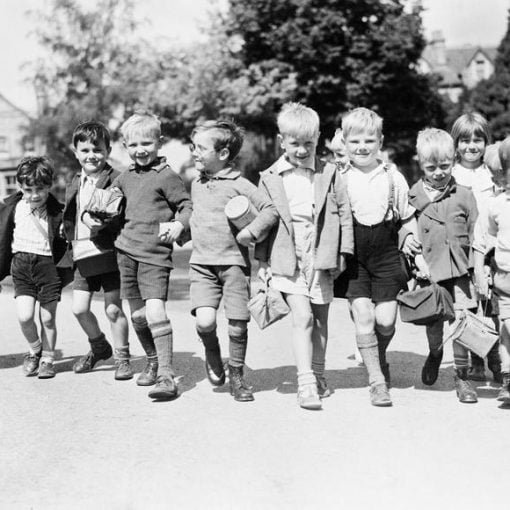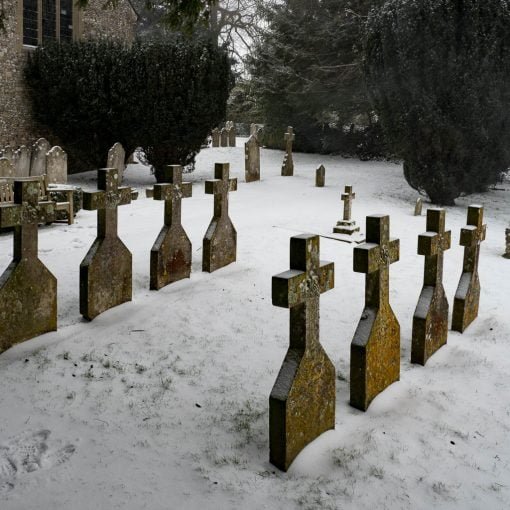The Parish of Compton said its farewells to Philip at a Memorial Parish Communion Service on Sunday morning, 10th May which was led by Canon Robert Teare, the Rural Dean. The Epistle was read by Councillor Adrian Walmsley, Chairman of the Parish Council, and the Gospel by Professor Ray Hills, Churchwarden; the Prayers of Intercession were led by Miss Mary Hinton, Mrs Joy Clarke, and Mr Philip Gorrod, and Reminiscences of Philip were given by Dr Bob Emmerson, Dr Peter Robinson, and Mr Derek Davidson.
Bob Emmerson said “At that magnificent service in the cathedral and in what has been written in the press, the focus has been on Philip’s scholarship, his academic achievements, his music, and his writings; and rightly so, because these were the activities that brought him eminence far outside the narrow confines of our two parishes; but today is our opportunity to remember him with gratitude as Philip our parish priest and Philip our friend.
I am sure that one of the major features of Philip’s ministry, that we will all remember and miss, was the skilled, calm and dignified manner in which he led our worship in this place. An unashamed traditionalist – from time to time some of us felt that he was sometimes overwedded to traditional forms of services. But he loved and understood the Liturgy, and if Philip was taking the service you could rest assured that there would be no embarrassing gaffes, and that it would proceed smoothly in a seemly and proper manner; and, if it was that kind of service, it would be graced by a thoughtful, well-crafted sermon, elegantly delivered.
However, those of us who on occasions were privileged to assist him in the sanctuary were sometimes aware of what this cost him and of what a struggle it was to go on. But go on he did!
I have to reveal to you that the pre-service discussions in the vestry were rarely concerned with weighty and profound liturgical matters. They sometimes centred on the fact that, on his way to church, Philip had heard on the car radio that England had just taken two quick wickets. And even more frequently that he had heard on the car radio that England had just lost two quick wickets.
Philip loved the game of cricket, and being Philip his knowledge of it was encyclopaedic. He was no mean performer himself in his younger days; good enough to represent his College, and he enjoyed his ‘days in the sun’ at Northlands Road. It was a matter of great joy to him that the great West Indian batsman, Desmond Haynes, asked Philip to officiate at his wedding and to baptise his children. As some of you will know, Desmond Haynes and his wife flew from Barbados to be at the requiem service in the Cathedral.
It is apparent from Philip’s book, ‘Barchester’, that he enjoyed strong characters of an independent turn of mind. I well remember one occasion when the late lamented Mrs Gwen Compton, when preparing for the christening of a newly arrived grandchild, discovered that a number of her other grandchildren had not been ‘done’, and she persuaded them to be christened at the same time. The result was that Philip found himself baptising seven Compton grandchildren with ages ranging from nine months to nineteen years. He enjoyed the situation hugely, and made it a fun occasion, but without, as you would expect, ever sacrificing its underlying seriousness and significance.
Philip Barrett was the first Rector of Compton and Otterbourne, and I suspect that from time to time many of us have been guilty of forgetting, that unlike previous Rectors that we recall, he was the first to have the care of two parishes. Moreover, he was pitched into that joint responsibility prematurely, before he had chance to really ‘play himself in’ at Otterbourne.
It was a notable achievement of his ministry that by his sensitivity and even-handedness in managing the situation, that in both parishes we looked upon him as our Rector, and that neither of us ever regarded ourselves as the ‘poor relation’ of the partnership. He has left a legacy of a joint benefice in which the two parishes work together amicably in a spirit of cooperation and mutual support. We owe it to Philip’s memory to ensure that that happy state of affairs is preserved.’
Peter Robinson said “In spite of a long-standing, chronic disability, Philip never complained and never made it an excuse; he displayed great courage and dedication, kindness and generosity of spirit. He wore his scholarship lightly and any questions or queries were answered with firm but gentle clarity.
He was shy by nature, a private man, but possessed of a keen sense of humour. Few would have seen an extrovert side to his nature. However, as President of the Over 60’s Club he readily joined in at their Christmas Dinner. More laughter came from his table than any other. At one of these events, hilarity began with his imitations of the Welsh accents of his neighbours, and increased during the announcement of the raffle numbers, when Philip instantly quoted the first line of the hymn of that number.
In contrast to this lighter side of his character many more saw his serious side; and all who sought his help in times of need or crisis found a depth of feeling and sympathy which gave them just the support they were seeking.”
Derek Davidson said: “This week we had Philip’s obituary in the Daily Telegraph, which was a splendid tribute but in my opinion glossed over his duties here as our Parish Priest, which I believe he did most conscientiously and with great flair. About ten years ago I asked him whether the Rotary Club could join the Parish for Matins one Sunday morning at the start of my year as President of the Club. The service he constructed (and he must have researched the matter thoroughly) was very meaningful to Rotarians, but in no way marginalised the regular congregation; this required great skill and sensitivity.
As a school governor, I valued his support and wise counsel, and I know more than one fellow governor who was helped by Philip at time of crisis. He was very good on a one to one basis, giving time very generously and never thrusting his scholastic ability and knowledge. He had great humility. The children particularly enjoyed one occasion, when OFSTED were inspecting, when he finished a school service wearing his old Portsmouth Grammar School cap.
I was fortunate to get to know this private and slightly shy man a little better when we spent a couple of evenings taping snippets of his favourite music for the Desert Island Discs entertainment last year. This was great fun and I cannot help but feel saddened that we are unable to continue to learn from and enjoy this caring man’s ministry and company.
I know he will indeed be greatly missed, and I suspect that we will be surprised just how much we do miss him.”




